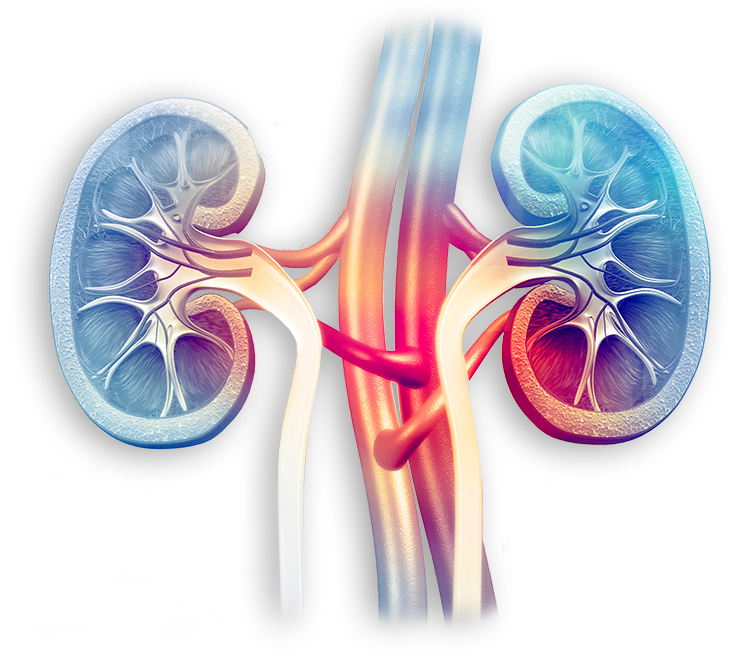Renal Disease Models
Comprehensive In Vivo Models and
Services for Kidney Diseases

Advancing Therapies for Renal Diseases
Drug discovery and development for renal diseases remain critical as the prevalence of kidney-related conditions continues to rise. Acute kidney injury (AKI) affects approximately 13 million people globally each year and significantly increases the risk of developing chronic kidney disease (CKD). Similarly, CKD, which affects over 850 million people worldwide, leaves patients more susceptible to AKI during illness or injury. These interconnected conditions lead to severe health complications and reduced quality of life, underscoring the urgent need for innovative therapeutic strategies to prevent, treat, and manage renal diseases. As a leading renal disease preclinical discovery research organization, we offer a diverse portfolio of rodent models of kidney disease and preclinical research services that support drug discovery efforts with clinically relevant and customizable solutions.
In Vivo Models of Renal Diseases
Acute Kidney Injury Models
AKI is a sudden and often reversible decline in renal function that can occur within a few hours or days. It happens when the kidneys are unable to filter waste products from the blood, leading to a dangerous buildup of toxins and chemical imbalances. AKI can range from mild impairment to complete renal failure.
Key Models
- Bilateral Renal Ischemia/Reperfusion (I/R) Mouse and Rat AKI Model
- Cisplatin-Induced AKI Rat Model
Chronic Kidney Disease Models
CKD is characterized by progressive renal failure. The kidneys filter waste and excess fluids from blood, which are then excreted in urine. In advanced stages, CKD can lead to dangerous imbalance of fluid, electrolytes, and waste in the body. CKD is a leading cause of death in the United States, affecting 14% of the population.
Key Models
- Adenine-Induced CKD Mouse and Rat Model
- Adriamycin-Induced CKD Rat Model
- Unilateral Ureteral Obstruction (UUO)-Induced Kidney Fibrosis Mouse and Rat Model
- 5/6 Nephrectomy Mouse and Rat CKD Model
- Uni-Nephrectomy + Unilateral Renal I/R Mouse CKD Model (AKI-to-CKD transition)
- Folic Acid-Induced Kidney Fibrosis Mouse Model (AKI-to-CKD transition)
Diabetic Kidney Disease Models
Diabetic nephropathy, or diabetic kidney disease, is the result of the gradual loss of kidney function in individuals with type I or type II diabetes mellitus. It is the leading cause of CKD and end-stage renal disease worldwide.
Key Models
- Streptozotocin (STZ)-Induced Diabetic Nephropathy Mouse and Rat Model
- db/db ± AAV-Renin Diabetic Nephropathy Mouse Model
- BTBR ob/ob Diabetic Mouse Model
- Zucker Diabetic Fatty Rat Model
- ZSF-1 Diabetic Nephropathy Rat Model
Hypertensive Nephropathy Models
CKD caused by hypertension, known as hypertensive nephropathy, is the second leading cause of CKD after diabetes. Hypertension triggers a series of pathological changes in the kidneys, resulting in various forms of kidney injury, including glomerular damage, renal fibrosis and renal dysfunction. These complications not only impair renal function but also increase the risk of stroke, heart attack, and death.
Key Models
- Angiotensin II-Induced Hypertensive Nephropathy Rat Model
- Dahl-Salt Sensitive (DSS) Rat Model
- DOCA+Salt-Induced Hypertensive Nephropathy Rat Model
Nephritis Models
Nephritis (or glomerulonephritis) is inflammation of the kidneys, specifically affecting the glomeruli. It may be caused by infections, inflammatory conditions (such as lupus), certain genetic disorders, or other diseases. Nephritis is a type of nephropathy, which encompasses several kidney and systemic conditions.
Key Models
- Anti-GBM-Induced Nephrotoxic Serum Nephritis Mouse Model
- Anti-Fx1a-Induced Passive Heymann Nephritis Rat Model
- Lupus Nephritis Mouse Model
Nephrotic Syndrome Models
Nephrotic syndrome, also known as nephrosis, is a manifestation of CKD that occurs when the body excretes excessive amounts of protein in the urine. It is often caused by damage to the podocytes – specialized glomerular cells that, along with the glomerular basement membrane and fenestrated endothelial cells, form a critical part of the kidney’s filtration barrier. An underlying health condition is typically a contributing factor to the development of nephrosis.
Key Models
- Puromycin Aminonucleoside Nephrosis (PAN) Rat Model
Not seeing the model you need? Explore all our models for Cardiovascular Disease or contact us to discuss developing a new renal disease model for your drug development program. Our deep commitment to scientific research and development drives the continuous creation of innovative models and the refinement of classic disease models, ensuring cutting-edge solutions tailored to your research needs.
Watch our on-demand webinar, Hypertension, A Driver of Cardiovascular and Renal Disease, where Inotiv scientists explore the role of translational animal models in cardiovascular and renal disease research. The webinar emphasizes hypertension as a key factor in disease progression and highlights how these models are used in the development of innovative therapeutics.
Featured speakers include Inotiv’s industry experts Crystal West, PhD (left) and Flavia Machado, PhD (right).

Selected Study Endpoints
As a leading kidney disease preclinical discovery research organization, we offer comprehensive in vivo pharmacology studies using our renal disease models to support drug discovery and development. Designed for high clinical relevance, our models enable the evaluation of in vivo efficacy, safety, and mechanistic insights into therapeutic candidates. In addition to pharmacology services, we conduct detailed pharmacological studies to better understand drug interactions and therapeutic potential. From experimental design to final data analysis, our scientific team collaborates closely with clients to ensure reliable and meaningful results. Here is a sample of our capabilities; however, we offer a broader range of services and work closely with our clients to develop customized solutions tailored to their specific research needs.
- Glomerular filtration rate (MediBeacon™)
- Systemic blood pressure
- Comprehensive panel of renal biomarkers
- Histology and pathology
Comprehensive Services for Drug Development
We provide a full suite of research services to support every stage of drug development, from early discovery to the critical data required for IND filings. Our integrated approach streamlines the process, enhancing efficiency and effectiveness. With a focus on customized solutions, we deliver robust, translational data to drive successful outcomes. Our expertise in preclinical research ensures rigorous evaluation of drug candidates, providing valuable insights to inform development decisions. Explore our key service areas, each designed to support drug discovery and development with precision and expertise.
In Vivo Models for Other Cardiovascular and Related Diseases
Failure Heart
Failure Inotiv provides translational rodent and large animal models, along with flexible research services and expert consultation, to accelerate heart failure drug discovery. Our in vivo pharmacology services deliver clinically relevant insights and robust efficacy data.
Disease Metabolic
Disease Inotiv supports diabetes, obesity, and metabolic disease research with in vivo models and tailored pharmacology studies. Our translational models deliver clinically relevant insights, with expert guidance from study design to data interpretation to advance therapeutic development.
Disease Pulmonary
Disease Inotiv provides in vivo models and pharmacology services to support pulmonary disease drug discovery. Our models reflect key features of obstructive, restrictive, and vascular conditions, enabling precise efficacy and safety assessment through customized, expert-guided studies.
Disease Hepatic
Disease Inotiv supports liver disease research with translational models and comprehensive ex vivo and in vivo services. We offer expert guidance and customizable studies to evaluate efficacy, safety, and mechanisms—advancing drug discovery with meaningful, clinically relevant results.



